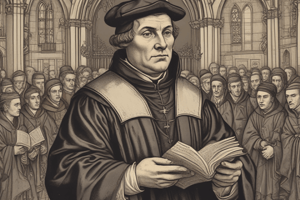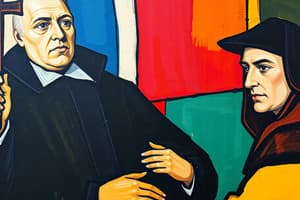Podcast
Questions and Answers
What was Luther's initial reaction to the rapid spread of his ideas?
What was Luther's initial reaction to the rapid spread of his ideas?
- He actively sought to take control of the Church.
- He was indifferent to the responses from the Church.
- He believed his ideas would be quickly silenced.
- He was surprised at how many followers he attracted. (correct)
What action did Pope Leo X take in response to Luther's growing popularity?
What action did Pope Leo X take in response to Luther's growing popularity?
- He threatened Luther with excommunication. (correct)
- He organized a public debate in support of Luther.
- He welcomed Luther to the Vatican for a discussion.
- He promoted Luther's ideas within the Church.
How did Luther respond to the Pope's threat of excommunication?
How did Luther respond to the Pope's threat of excommunication?
- He complied and retracted his statements.
- He ignored the threat altogether.
- He burned the pope's decree in front of his students. (correct)
- He sought refuge with the Holy Roman Emperor.
What was the primary reason for Holy Roman Emperor Charles V's opposition to Luther?
What was the primary reason for Holy Roman Emperor Charles V's opposition to Luther?
What did Luther quote as his justification for refusing to recant his statements?
What did Luther quote as his justification for refusing to recant his statements?
What was one significant consequence of Henry VIII's actions on England during the second half of the 1500s?
What was one significant consequence of Henry VIII's actions on England during the second half of the 1500s?
How did the Catholic Church most likely respond to Luther's teachings?
How did the Catholic Church most likely respond to Luther's teachings?
What type of debate does the content suggest imagining with a leader of the Catholic Church?
What type of debate does the content suggest imagining with a leader of the Catholic Church?
Which of the following aspects would likely be important when creating a graphic comparing countries where Protestantism is major?
Which of the following aspects would likely be important when creating a graphic comparing countries where Protestantism is major?
In what way might library resources enhance the comparison of Protestantism across different countries?
In what way might library resources enhance the comparison of Protestantism across different countries?
Flashcards are hidden until you start studying
Study Notes
The Response to Luther
- Luther's ideas rapidly gained followers among those discontented with the Church's political and economic control.
- Church officials initially regarded Luther as a rebellious monk, underestimating the widespread appeal of his teachings.
- By 1520, Pope Leo X issued a decree threatening Luther with excommunication unless he recanted, which Luther openly defied.
- Luther openly rejected the Pope's authority, symbolized by burning the papal decree in a public act of defiance, resulting in his excommunication.
The Emperor's Opposition
- Holy Roman Emperor Charles V, a staunch Catholic, opposed Luther and summoned him to trial at the Diet of Worms in 1521.
- Luther famously refused to retract his statements, claiming he was bound by Scripture and his conscience, leading to his condemnation.
Impact of German Princes
- Many northern German princes supported Lutheranism for both genuine belief and opportunistic reasons, seeking to seize church properties and assert independence from Charles V.
- In 1529, princes loyal to the Pope formed a coalition against Luther, leading to the emergence of the term "Protestant" for those who opposed the Catholic Church's authority.
The Peace of Augsburg
- Following conflicts, Charles V declared the Peace of Augsburg in 1555, allowing each German prince to determine the religion of their own state, acknowledging the division between Protestantism and Catholicism.
England's Break from the Catholic Church
- Henry VIII broke ties with the Roman Catholic Church for political and personal reasons rather than religious ones, primarily his need for a male heir to secure the dynasty.
- Initially a devout Catholic, Henry VIII later opposed the Pope's authority, leading to the establishment of the Church of England and the English Reformation.
Studying That Suits You
Use AI to generate personalized quizzes and flashcards to suit your learning preferences.




